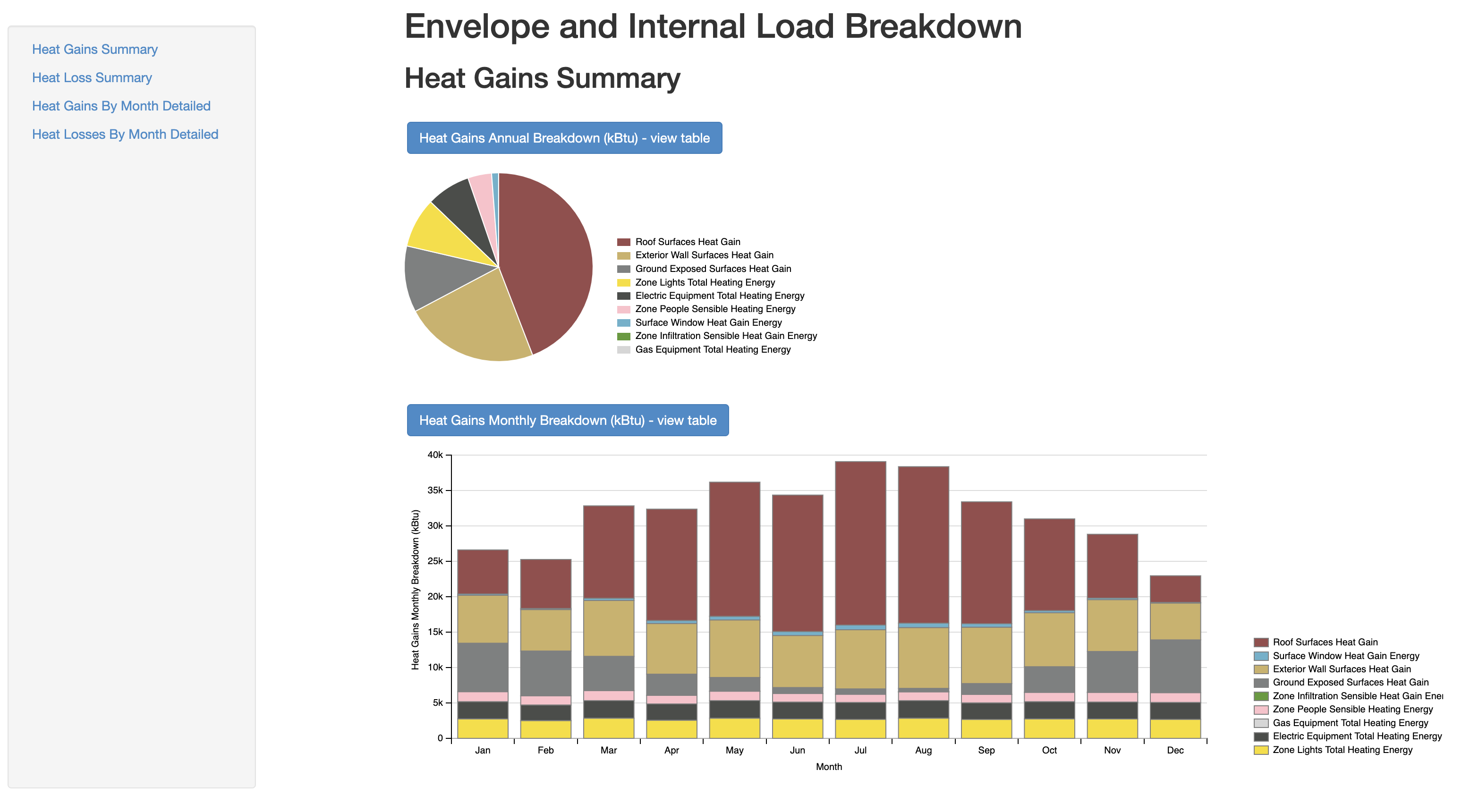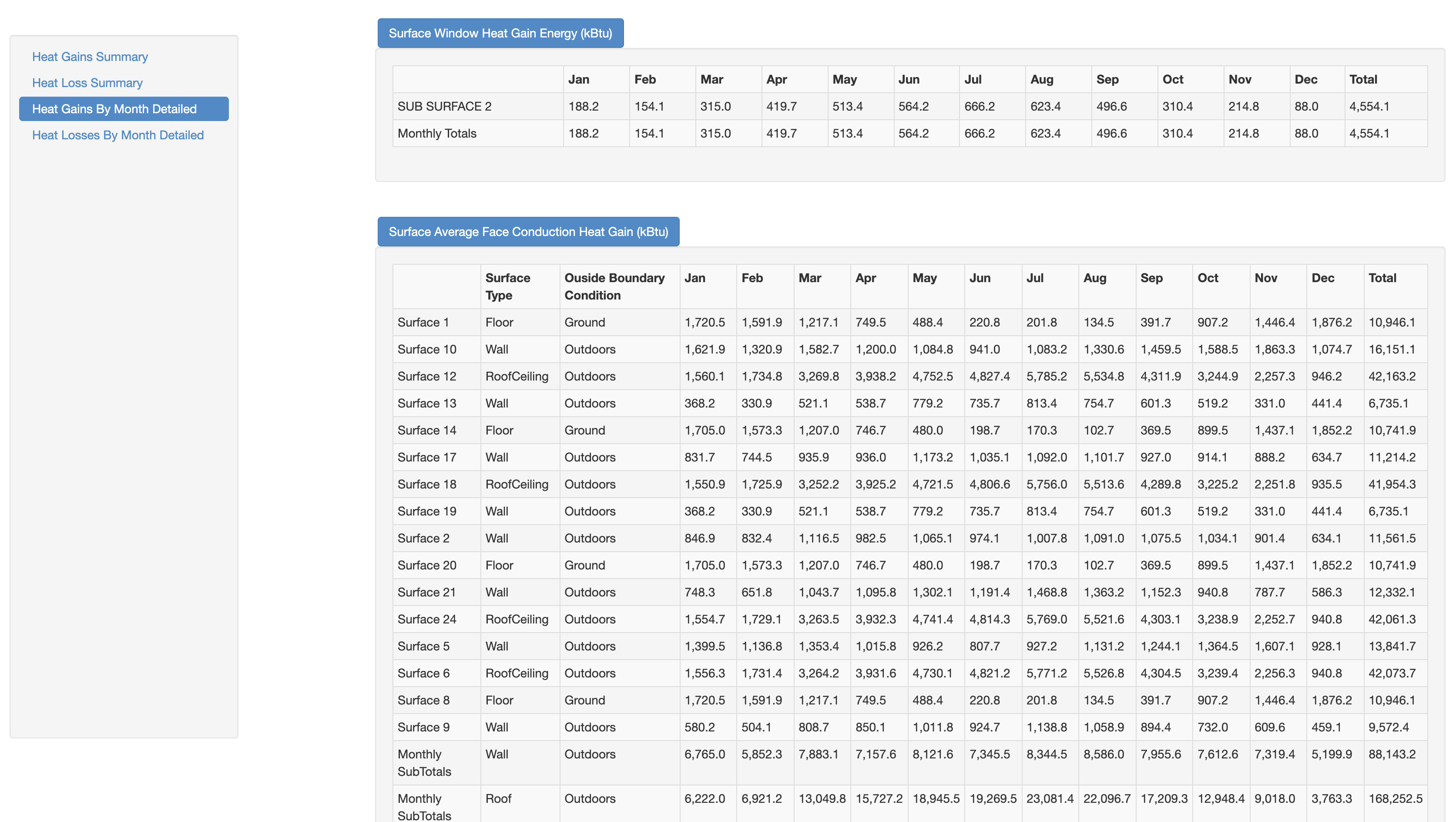First time here? Check out the Help page!
 | 1 | initial version |
If you just want to get internal loads (plug, lighting) you could use annual equivalent hours method along with the installed level to calculate this. This would jsut use model input data so it could be done on the fly in the model without needed a simulation; it does not however account for reduction in lighting from daylight sensors, just what is scheduled. You could also output individual equipment objects as time series objects, and in reporting measure aggregate them by space. The Env. and Int gain main gets hourly surface heat gain and loss, that could also be aggregated by space.
 | 2 | No.2 Revision |
If you just want to get internal loads (plug, lighting) you could use annual equivalent hours method along with the installed level to calculate this. This would jsut use model input data so it could be done on the fly in the model without needed a simulation; it does not however account for reduction in lighting from daylight sensors, just what is scheduled. You could also output individual equipment objects as time series objects, and in reporting measure aggregate them by space. The Env. Envelope and Int Internal gain main measure gets hourly surface heat gain and loss, that could also be aggregated by space.space.
https://github.com/NREL/openstudio-common-measures-gem/tree/develop/lib/measures/envelope_and_internal_load_breakdown
 | 3 | No.3 Revision |
If you just want to get internal loads (plug, lighting) you could use annual equivalent hours method along with the installed level to calculate this. This would jsut use model input data so it could be done on the fly in the model without needed a simulation; it does not however account for reduction in lighting from daylight sensors, just what is scheduled. You could also output individual equipment objects as time series objects, and in reporting measure aggregate them by space. The Envelope and Internal gain measure gets hourly surface heat gain and loss, that could also be aggregated by space. https://github.com/NREL/openstudio-common-measures-gem/tree/develop/lib/measures/envelope_and_internal_load_breakdown
It is an reatibly unknown measure but has a lot of potential (It would be great to come represent impact of ventilation and identify beneficial vs. harmful gain/losses. Main charts Look like OpenStudio Results but pie chart is broken down by building components instead of end uses (although some items are light lights are both)
The envelope components are aggregated from hourly data on each surface. I'm aggregating them by surface type bu could be space. Could even add extra table to this report by space.
 | 4 | No.4 Revision |
If you just want to get internal loads (plug, lighting) you could use annual equivalent hours method along with the installed level to calculate this. This would jsut use model input data so it could be done on the fly in the model without needed a simulation; it does not however account for reduction in lighting from daylight sensors, just what is scheduled. You could also output individual equipment objects as time series objects, and in reporting measure aggregate them by space. The Envelope and Internal gain measure gets hourly surface heat gain and loss, that could also be aggregated by space. https://github.com/NREL/openstudio-common-measures-gem/tree/develop/lib/measures/envelope_and_internal_load_breakdown
It is an reatibly a relatively unknown measure but has a lot of potential (It would be great to come represent impact of ventilation and identify beneficial vs. harmful gain/losses. Main charts Look like OpenStudio Results but pie chart is broken down by building components instead of end uses (although some items are light lights are both)
<having problem="" adding="" screenshot="" will="" try="" later="">
The envelope components are aggregated from hourly data on each surface. I'm aggregating them by surface type bu could be space. Could even add extra table to this report by space.
<having problem="" adding="" screenshot="" will="" try="" later="">
 | 5 | No.5 Revision |
If you just want to get internal loads (plug, lighting) you could use annual equivalent hours method along with the installed level to calculate this. This would jsut use model input data so it could be done on the fly in the model without needed a simulation; it does not however account for reduction in lighting from daylight sensors, just what is scheduled. You could also output individual equipment objects as time series objects, and in reporting measure aggregate them by space. The Envelope and Internal gain measure gets hourly surface heat gain and loss, that could also be aggregated by space. https://github.com/NREL/openstudio-common-measures-gem/tree/develop/lib/measures/envelope_and_internal_load_breakdown
It is a relatively unknown measure but has a lot of potential (It would be great to come represent impact of ventilation and identify beneficial vs. harmful gain/losses. Main charts Look like OpenStudio Results but pie chart is broken down by building components instead of end uses (although some items are light lights are both)
<having problem="" adding="" screenshot="" will="" try="" later="">
The envelope components are aggregated from hourly data on each surface. I'm aggregating them by surface type bu could be space. Could even add extra table to this report by space.
<having problem="" adding="" screenshot="" will="" try="" later="">

 | 6 | No.6 Revision |
If you just want to get internal loads (plug, lighting) you could use annual equivalent hours method along with the installed level for each internal load instance to calculate this. This would jsut just use model input data so it could be done on the fly in the model without needed a simulation; it does not however account for reduction in lighting from daylight sensors, just what is scheduled. You could also
Another approach would be to output timeseries data for individual equipment objects as time series objects, and in reporting measure aggregate them by space. The existing Envelope and Internal gain measure gets hourly surface heat gain and loss, that could also be aggregated by space.
https://github.com/NREL/openstudio-common-measures-gem/tree/develop/lib/measures/envelope_and_internal_load_breakdown
It is a relatively unknown measure but has a lot of potential (It would be great to come represent impact of ventilation and identify beneficial vs. harmful gain/losses. Main charts Look like OpenStudio Results but pie chart is broken down by building components instead of end uses (although some items are light lights are both)

The envelope components are aggregated from hourly data on each surface. I'm aggregating them by surface type bu could be space. Could even add extra table to this report by space.

 | 7 | No.7 Revision |
If you just want to get internal loads (plug, lighting) you could use annual equivalent hours method for ruleset schedule along with the installed level for each internal load instance to calculate this. This would just use model input data so it could be done on the fly in the model without needed a simulation; it does not however account for reduction in lighting from daylight sensors, just what is scheduled.
Another approach would be to output timeseries data for individual equipment objects and in reporting measure aggregate them by space. The existing Envelope and Internal gain measure gets hourly surface heat gain and loss, that could also be aggregated by space. https://github.com/NREL/openstudio-common-measures-gem/tree/develop/lib/measures/envelope_and_internal_load_breakdown
It is a relatively unknown measure but has a lot of potential (It would be great to come if it was extended to represent impact of ventilation and identify beneficial vs. harmful gain/losses. gain/losses). Main charts Look like OpenStudio Results but pie chart is broken down by building components instead of end uses (although some items are light lights are both)both).

The envelope components are aggregated from hourly data on each surface. I'm aggregating them by surface type bu could be space. Could even add extra table to this report by space.

